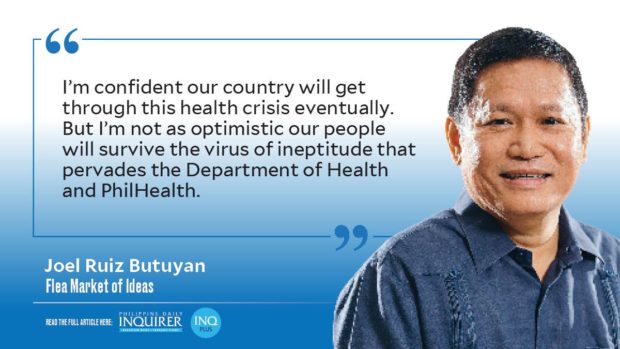The virus finally caught up with me
Before the first pandemic lockdown was imposed in March 2020, I hastily retreated from Makati City to my wife’s hometown in Alcala, Cagayan, hoping that I would have better chances of avoiding the virus from there. Last week, COVID-19 finally caught up with me.
I sat down to write this piece a day after it was confirmed that I have COVID-19. I had been experiencing the symptoms for six days, so when the laboratory results came, it merely validated what I already knew. Besides, my wife had contracted the virus a few days earlier, so I was sure that the symptoms I was experiencing, which were similar to hers, were caused by COVID-19. After I joined my wife in our quarantine quarters, we got jolted with news that our three-year-old son’s nanny was feeling a slight sore throat, which was the first symptom my wife and I experienced. We were worried for our nanny, but as parents, we were most tormented by two possibilities: (a) that our child may have contracted the virus, or; (b) if our boy didn’t contract the virus, everyone might hesitate to act as his temporary foster parent for fear that he might still be an undetected carrier of the virus.
I imagine that this problem has anguished many COVID-19-positive parents with minor children. I imagine that many children continue living with their infected parents because of lack of other options. It’s not farfetched to think that even close relatives will have second thoughts volunteering to take care of the child of a relative suffering from COVID-19. I strongly advise parents with minor children to make advance arrangements to address this potentially serious problem. Luckily, our toddler and his “Mama Sonia” turned negative in their COVID-19 tests.
My wife and I had been fully vaccinated with Sinovac since last May, but we both suffered “breakthrough” infections. We experienced multiple symptoms such as painful sore throat, clogged nose, headache, lower back pain, and body weakness. My wife also lost her sense of smell. Nights are long because I keep waking up every hour, and my head has to be propped up by four big pillows for me to have a chance at sleeping. It’s the worst flu-like illness I’ve experienced in my life.
Even after we completed our initial dosage of antibiotics, some of the symptoms persisted. This worried the two doctors who were monitoring us. They directed us to have a chest X-ray and blood analysis. However, we live in a small town with no facilities for such tests. We had to go to Tuguegarao City, an hour away, where we went to a hospital that was willing to extend outpatient X-ray and laboratory tests for people with COVID-19. The test results showed that my wife had developed pneumonia, while mine showed that something was not right with my kidneys. The tests enabled our doctors to prescribe additional medicines for us. Our conditions were not very serious, but we needed proactive treatment in order to prevent further deterioration.
I felt that outpatient lab tests are a good alternative to hospital confinement for ill people who continue to have symptoms despite the initial dose of prescribed medicine. Had we aimed for hospital confinement, we did not stand a chance because all hospitals in our province are full to the brim. I’m not sure if there are protocols in this regard, but it may help to de-clog hospitals if patients are proactively told to undergo outpatient tests first so that doctors can give them additional medicines and they can continue recuperating outside of hospitals.
As my wife and I continue to recuperate, I read in the news that there have been mass protests among health workers because the Department of Health (DOH) has not released their promised benefits. Hospitals have also threatened to disengage from PhilHealth because tens of billions of their billings have not been paid.
I’m confident our country will get through this health crisis eventually. But I’m not as optimistic our people will survive the virus of ineptitude that pervades the DOH and PhilHealth.





















